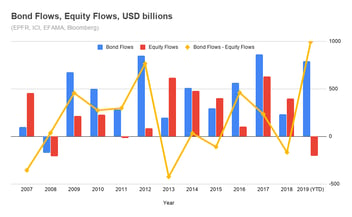
By Measured Wealth Private Client Group
Did you know that humans are naturally averse to loss? Whether it’s losing your wallet, losing an income stream, or losing a large chunk in your portfolio, financial losses can cause stress and make us feel overwhelmed.
However, if we make emotional decisions in response, we can act irrationally in an attempt to avoid loss, causing us to lose even more. Just ask any investor who sold stock when the market dropped and missed the recovery. It can be hard to know when—and how—to act.
You know you need to invest to grow your money into a nest egg that will sustain you in the future, but what can you do to prevent taking on too much risk in the process?
What Does Risk Tolerance Really Mean?
In the financial world, risk tolerance is defined as a measure of one’s financial ability to withstand losses. While you can’t completely eliminate risk in your portfolio, you can ensure that the amount of risk you take correlates with the level of potential reward for you to gain. It is more than possible to match your investments to your goals while still being able to sleep at night during market downturns.
Here’s the thing we need to remember when we’re tempted to get out of the market ASAP: some risks are avoidable, some are not. Avoidable risks are those that occur when your portfolio leans too heavily on stocks or bonds that have been unstable in the past or when your holdings are not diversified appropriately. For example, you may be putting too much of your company’s stock in your 401(k) plan. Or you may have an overabundance of overlapping U.S. stock mutual funds instead of being more globally diversified. Avoidable risks often occur when we underestimate risk and believe we can tolerate more than we actually can.
On the other hand, unavoidable risks are those that occur because our world is ever-changing, volatile, and we can’t predict everything. As much as we wish they weren’t, unavoidable risks are simply out of our control. This type of risk includes unfortunate events like geopolitical issues, global pandemics, and economic recessions.
The third category of risk is often unseen, but it can impact your portfolio just as intensely as an obvious risk: the risk of being too conservative and not achieving your future goals as a result. By overestimating risk and trying to avoid loss at any cost, you could be unintentionally sacrificing your future dreams.
How Can I Be Comfortable With Risk?
If only it were as simple as telling your advisor you’re comfortable taking on “moderate” risk. The truth is that everyone, based on their age, life circumstances, personality, and time horizon, has their own unique risk tolerance level. How do you pinpoint how much risk you’re comfortable taking, how much risk you need to take to reach your goals, and how much risk you currently have in your portfolio?
That’s where an experienced financial advisor comes in and can make a world of difference. At Measured Wealth Private Client Group, we are dedicated to providing retirement plan investment management and strategic planning. We’re passionate about balancing risk versus reward and guiding clients from accumulation to distribution with confidence. We believe in the power of building strong, long-lasting relationships with our clients, becoming a true partner on your financial journey so you can focus on what matters most to you.
Schedule an introductory appointment online or by calling our office at 603-431-1444 or visiting our Measured Wealth Private Client Group website to set up a complimentary consultation.
About Measured Wealth Private Client Group
Measured Wealth Private Client Group, LLC was founded on the core values of our country, hard work, integrity, and uncompromising quality. Independence is our backbone. We diligently work for each client, assisting them in reaching their financial goals.
For 20 years we have inspired our clients to make informed decisions through education, communication, and service which exceeds their expectations. We serve a select client base, and for the benefit of our existing clients, we have a mutual selection process of accepting new clients every year.
We invite you to explore Measured Wealth Private Client Group, LLC and “Experience the Difference.”




.png?width=352&name=Measured%20Wealth%20Blog%20Images%20(1).png)